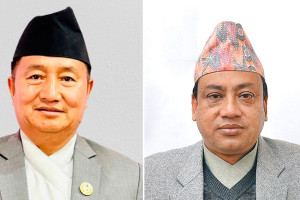Columns
All is not well
Genuine grievances continue to haunt Nepal-India ties, but our institutional lapses must be fixed first.
Anurag Acharya
The moment Prime Minister Pushpa Kamal Dahal stood in front of cameras alongside Indian Prime Minister Narendra Modi at New Delhi’s Hyderabad House, there were indications that the two leaders may have had a difficult conversation. While Modi managed to shrug off the tensions by making a statement laden with his usual poetic analogies, Dahal’s expressions and body language gave a lot away. We may not know exactly what transpired between the two leaders during this visit, besides what the official statement says. But all is definitely not well between the two governments.
The fallout
When Narendra Modi came to power in 2014, Nepal-India ties were already strained due to New Delhi’s active interest in Nepal’s constitution drafting process. India’s role in mediating the 12-point understanding between the then CPN-Maoists and seven political parties, which paved the way for the peace process in Nepal, emboldened South Block and the Indian mission in Kathmandu to assume a more vocal role. To be fair, the sensitivity of the open borders justified India’s concerns regarding the genuine grievances and interests of the Madhesis and the Tharus, despite the fact that New Delhi’s closest ties were forged with those inside Kathmandu’s corridors of power.
However, the exhausting and complicated domestic bargains involving several political parties, Madhesi Morcha, Tharuhat activists, and the cross-party Janajati caucus, among others, meant that Modi’s predecessor Manmohan Singh or his senior cabinet members did not have the political appetite to engage on a day-to-day basis. As a result, there was bureaucratic meddling instead of genuine diplomatic engagement from India. And the change of administration under Narendra Modi simply provided continuity to that arrangement. Interestingly, among the voices in Nepal who have pointed at Indian meddling, the loudest were of those who have historically wielded state powers and privileges, and benefitted from politically disempowering Madhesis, Janajatis and Tharus.
There are people within various political parties, the media, civil society, security institutions and bureaucracy who have taken such a hardline. It is as much due to them, as it is due to India’s failed Nepal policy, that there has been a rise in “anti-India” sentiments across Nepali society. And this has had an unfortunate bearing on efforts from both sides to normalise relations. The fact that the Indian side is still sulking over KP Sharma Oli’s misadventures and remains suspicious of Pushpa Kamal Dahal was quite obvious in the lack of warmth the Nepali delegation (including the media) felt in New Delhi last week.
For too long, our politicians and diplomats have tried to give the impression that they are best buddies with their Indian counterparts. They are not. And the sooner we acknowledge this, the quicker we as a nation can start thinking about how we plan to reset this relationship on our end. Let them worry about what they wish to do on their side.
No reset button
There is obviously no reset button to troubleshoot a plethora of issues that have shrouded bilateral ties. So, instead of trying to achieve everything, prioritising what we can take up during future bilateral exchanges makes more sense.
For instance, complex and contested issues like border claims and the Eminent Persons Group report that encompass long-term agendas and require closer engagements at the top level must not be rushed when the level of trust between the two sides isn’t quite high. It is easier for chest-thumping nationalists to demand “tougher negotiation” from our visiting delegation, but they forget that there has to be a willingness on the other side to engage on those issues. One of the reasons why our delegation falls short on its delivery is due to a lack of pre-agreement with the host government(s) on the agenda of discussion. It is not what we wish for, but what our mutual interests with the host government(s) allow for, that should drive our bilateral initiatives.
Deeper physical connectivity and cooperation on energy with the neighbourhood, for example, is an agenda both Nepal and India seem to be prioritising in their foreign policies. Even during Dahal’s visit, the Indian side was more willing to discuss prospects of increasing energy trade, building bridges and oil pipelines, extending railway lines and easing electronic payment system between the two countries. These issues are equally crucial for Nepal, and there is no reason why we should not be happy prioritising them. On energy, the Indian prime minister has publicly spoken about facilitating electricity trade between Nepal and Bangladesh. The prospects of this happening was not bright even a few years ago, according to our domestic experts.
Let us then acknowledge that we have made progress. Although, we have to gradually negotiate with the Indian side and argue against unfeasible conditions they have set with regards to selecting the projects they want to import power from. It is up to both sides to create a conducive environment where they can negotiate on more contested issues, including those pertaining to disputed borders and past treaties. Creating a mutual incentive to engage on these issues is integral to that process.
The next step
Most countries that have successfully maintained their international relations have functioning institutions and well-articulated foreign policies that guide external engagements and negotiations. In our case, we have neither built trust-worthy institutions, nor have we been able to domestically agree on the tenets of our foreign policy especially vis-à-vis our close neighbours and development partners. As a result, a degree of ad hoc-ism drives the foreign policy of every new government that takes over at Singha Durbar.
It is amazing that having worked as a foreign policy observer for over a decade now, I do not recall being consulted by a single government before it visits abroad or hosts a foreign delegation. I have regularly interacted with peers from my generation, and they have similar disappointment. It is as if our government or the parliamentary committee that advises the government on international affairs has little appetite for research or informed expertise. The results were once again visible in the lack of preparations and presentation in New Delhi.
Finally, if we have to get over the present ad hoc mentality and instill a functioning system that guides our foreign policy thinking, we also have to improve our public and media discourse. The way the Millennium Challenge Corporation saga unfolded in the Nepali media, the way we continue to discuss our border disputes with India, and the way we react domestically to international developments, show we must institutionalise our domestic discourse and ground it on informed analyses and not on political ranting. This will not only help counter disinformation, but also make public discourse more robust and, hopefully, restore trust in our institutions and processes.




 29.24°C Kathmandu
29.24°C Kathmandu






.jpg&w=200&height=120)










